| Here's a special post for Janeites -- the insights in today's blog post will be intelligible only to people who are well acquainted with the plot of Jane Austen's masterpiece Emma. |
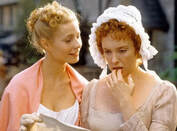
I recently received a flurry of emails from a well-known (if controversial) Jane Austen researcher asking to rebut my "completely misguided" comments about Jane Austen's novel Emma. He said I was "blissfully unaware" of the real reason that Emma Woodhouse prevented Harriet Smith from marrying Robert Martin. His theory is that Emma contains several hidden plots, all of which indicate Austen's truly radical beliefs.
In a gesture of good faith, I have agreed to share his theory that a dramatic “subterranean story” (one of many) lurks beneath the placid surface of Emma. What follows are his insights, not mine:
My careful research has exposed the subterranean stories in Emma that concern the side characters. Just to briefly recap my discoveries, Harriet Smith is really Miss Bates’s daughter, or possibly Jane Fairfax’s half-sister.
Since I’m a committed feminist, I take it for granted that whenever a female character gets ill, it has to be about her reproductive organs. This is not reductive misogyny, it's just a fact. Therefore, Jane Fairfax is hiding a secret pregnancy in the third volume. Mrs. Weston is only pretending to be pregnant (you notice she never gets ill) and she adopts Jane Fairfax’s baby.
These stories represent Austen's suppressed howl of rage against the patriarchy, but more on that later.
But what about Emma herself? It’s time to unveil the biggest subterranean story of all! How could anyone read what Emma Woodhouse says about Robert Martin—that he’s ignorant, and “clownish,” and “remarkably plain,“ and not smell a rat? Surely, to borrow a phrase from Shakespeare, “the lady doth protest too much.” Emma is just throwing sand in Harriet’s eyes...
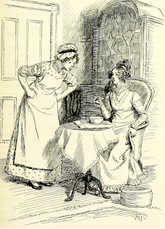
The evidence is there from the very beginning of the novel. We’re told that Emma is sad. Sad because her governess got married? No, of course not. It’s because her father accidentally ruined her arrangements for getting together with Robert Martin. Mr. Woodhouse suggested that Mr. and Mrs. Weston hire Hannah, the daughter of the coachman, as a servant at their house. Yes, Emma tries to cover it up and pretends like it’s a great thing, but underneath, she’s really seething!
Why was Hannah essential to Emma's secret meetings with Robert Martin? It’s so obvious, but I’ll explain it anyway. Mr. Woodhouse says, Hannah “always turns the lock of the door the right way and never bangs it.” Emma needs a servant who can open and close a door quietly to sneak Robert Martin into the house and up to her bedroom! Emma brings Hannah to the house supposedly “to do needlework” so don't overlook the phallic symbolism of the "needle" in "needlework."
Mr. Woodhouse, like most of you readers, is completely in the dark about Emma's secret affair. He had a lot of illegitimate children himself in his younger days and probably has syphilis, but that doesn’t mean he wants his daughter involved with a farmer.
At any rate, Emma is wondering if she can start meeting Robert Martin at Mrs. Weston’s house, and we have proof that Mrs. Weston is in on the plan. Mrs. Weston “could not think, without pain, of Emma’s losing a single pleasure,” such as not having a private place to meet her lover! So, “many a long October and November evening must be struggled through at Hartfield” until Emma can rearrange things. Austen makes sure to tell us that Emma can walk to Randalls (“solitary female walking”) which means no witnesses.
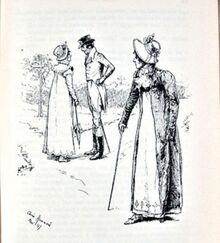 "after looking very respectfully at" Emma
"after looking very respectfully at" Emma Emma and Robert Martin at least attempted to meet at the Westons, because later, we notice—well, if you’re an alert reader, that is--we notice Austen’s suspicious wording when she mentions Mrs. Weston’s “consciousness of there being but two spare rooms in the house.” Consciousness? Why would she use that word? A word which sounds so close to conscience, in an obvious nod to Shakespeare's Hamlet: “conscience makes cowards of us all.”
Obviously, Mrs. Weston feels self-conscious when her husband talks about inviting everyone to sleep over at Randall’s for the night, because it reminds her of how she helped Emma sneak into those spare bedrooms before!
So, no wonder Emma interferes when she realizes that Robert Martin is attracted to Harriet! And do you think she would have taken Harriet for a visit to Abbey Mill Farm, even for fifteen minutes, if she thought that there was a chance Harriet would meet him there? No! Emma knew he wouldn’t be there because she had already made arrangements to meet him nearby. That business about her going to visit an an old servant who lived nearby was just a cover story.
Then, there’s another giant clue—after Harriet and Emma leave the farm, there is that strange business about the Westons. Why is Emma in such a bad mood just because they aren’t at home? (“I do not know when I have been so disappointed.”) Isn’t that a bit of an overreaction? Of course it is. She isn’t in a bad mood because the Westons aren’t home. She’s in a bad mood because the Westons “had both been out some time,” and that means they will be back soon. Do I have to spell it out for the dull-minded? All right, I will—this means Mrs. Weston screwed up the timing of the plan—the plan that Emma just communicated to Robert—that they would get together--in one of those “spare rooms”--that very afternoon at the Westons. “So provoking!” as Emma says. Or should we say, “so provocative”! Again, the delicious wording gives it all away.
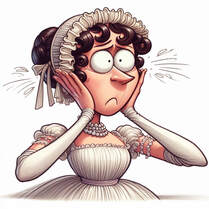
Emma first tries to distract Harriet away from Robert Martin by telling her that Mr. Elton admires her ("It is a certainty"). Later, when she thinks Harriet has fallen for Frank Churchill, Emma feels confident enough to actually throw her affair in Harriet’s face when she tells her: “there have been matches of greater disparity.” Clearly, she thinking of a match between herself and Martin. But while Emma thinks she is deceiving everyone, she is also being deceived.
Harriet throws Emma off the scent when she pretends to have a toothache. She goes to London, meets up with Robert Martin and gets engaged, with the help and connivance of Emma's sister Isabella.
When Mr. Knightley gives Emma the news, she is so shocked she almost gives the game away as she exclaims: “No, this is impossible!” Then she pulls herself together and pretends to be delighted, even pretending that she's never met Robert Martin before: “It would be a great pleasure to know Robert Martin.” Oh, please! Not, "be introduced to" him, or "make his acquaintance," as you might expect Austen to phrase it. No, Austen is playing with a double meaning here. Emma's already known Robert Martin quite a few times--in the biblical sense of the word. Just as in Shakespeare's Much Ado About Nothing: "She knows the heat of a luxurious bed."
Now, how could anyone say this theory is just projection on my part? No, not when all the pieces fit so neatly together. All I did was point out what is right there! Because I was the only person clever enough to find the hidden story!
Still unconvinced? I’ll lay down my final card, and it is truly unanswerable. The anagram for “Robert Martin” is “rib retort man.” “Rib” is clearly a sarcastic reference to Genesis 2:22-24, when God created woman out of Adam's rib. Women are oppressed under the patriarchy, and the secret subplot I’ve uncovered is Austen’s devastating retort. That should overturn all the safe, conservative interpretations of Austen!
-- Solo Farlip, independent researcher
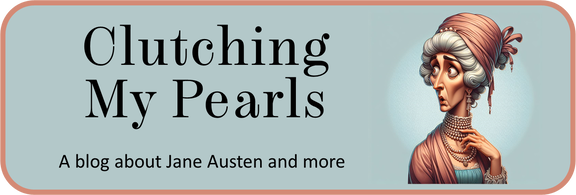
 RSS Feed
RSS Feed